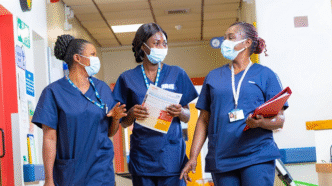The Nursing and Midwifery Council of Nigeria (NMCN) has appealed to nursing graduates across Nigerian universities to resist the growing trend of leaving the country for greener pastures abroad, and instead dedicate their skills to the service of the nation.
This call comes at a time when Nigeria’s healthcare sector is facing unprecedented challenges, particularly due to the alarming rate of brain drain among healthcare professionals. Nurses, midwives, and other medical workers have continued to emigrate in large numbers in search of better pay, improved working conditions, and career advancement opportunities.
The Appeal from NMCN
Speaking during an engagement with graduating nurses, the Registrar of the NMCN underscored the critical role nurses play in the healthcare delivery chain. He emphasized that the country has invested heavily in their education and training, and it was only fair for them to give back to society by serving within the Nigerian health system.
“We understand the temptation and the pressure to seek opportunities abroad,” the Registrar said. “But we must remember that our communities, our mothers, and our children depend on us. The strength of any healthcare system lies in the commitment of its frontline workers. We are urging our graduates to see themselves as nation-builders and patriots whose service is indispensable.”
According to the NMCN, nurses represent the backbone of healthcare delivery, especially in rural areas where doctors are scarce. The council argued that the mass exodus of nurses is already crippling service delivery, leaving hospitals understaffed and increasing the burden on the few who remain.
Rising Trend of Nurse Migration
The appeal comes against the backdrop of a concerning trend: Nigeria has witnessed a sharp increase in the number of nurses and midwives applying for verification of certificates to enable them to work abroad.
Recent data from professional bodies indicate that thousands of Nigerian nurses migrate annually to countries such as the United Kingdom, the United States, Canada, and the Middle East. These destinations offer far higher wages, advanced working facilities, and better career development pathways compared to what is obtainable in Nigeria.
For example, while a registered nurse in Nigeria may earn around ₦100,000 to ₦150,000 monthly, the same professional in the UK or US can earn the equivalent of over ₦1 million per month. This wide pay disparity, coupled with poor working conditions, dilapidated hospitals, and insecurity in some parts of the country, has fueled the ongoing brain drain.
Impact on Nigeria’s Healthcare System
The consequences of this migration wave are dire. Experts warn that the continuous outflow of skilled healthcare professionals threatens to collapse Nigeria’s fragile health infrastructure. Hospitals in many states already face staff shortages, leading to long patient waiting times, overworked health professionals, and increased mortality rates from preventable illnesses.
In rural communities, the situation is even worse. Many primary health centers are left with only a handful of nurses struggling to manage hundreds of patients. Some facilities operate without midwives, leaving expectant mothers at risk during childbirth.
The NMCN stressed that without urgent intervention to retain trained nurses, Nigeria risks undermining its progress toward achieving universal health coverage and meeting the Sustainable Development Goals (SDGs) on health.
A Call to Patriotism
In its appeal, the council framed the issue as a matter of patriotism and national responsibility. It urged nursing graduates to view their work not merely as a profession but as a calling.
“The future of our healthcare system depends on the decisions you make today,” the NMCN Registrar told the graduates. “While other nations may be calling, remember that it is here at home that your impact will be most felt. Every life you save here contributes to the strength and progress of our nation.”
He acknowledged the challenges within Nigeria’s health sector but encouraged graduates to be part of the solution. According to him, abandoning the system altogether would only deepen the crisis.
Reactions from Nursing Graduates
Nursing graduates have expressed mixed reactions to the appeal. Some acknowledged the importance of serving their country but highlighted the need for the government to address the root causes of migration.
A graduate from the University of Lagos explained, “We are proud to be nurses and want to serve our people. But the reality is that many of us can barely survive on the current pay. Hospitals lack equipment, and sometimes we buy our own materials to work. The government must show commitment by improving working conditions if they want us to stay.”
Another graduate from the University of Nigeria Nsukka added, “It is not that we want to abandon Nigeria. But when you see your colleagues abroad living comfortably, saving lives in modern facilities, and earning enough to take care of their families, the choice becomes difficult. We need motivation at home too.”
Stakeholders Weigh In
Health sector stakeholders have called for a more balanced approach. While they applauded the NMCN’s patriotic appeal, they stressed that emotional appeals alone cannot stop migration.
The Nigeria Labour Congress (NLC) has repeatedly urged the government to tackle the issue of poor remuneration for health workers. Similarly, the Nigerian Medical Association (NMA) has described the brain drain as a “national emergency” requiring urgent intervention.
Public health experts suggest that retaining nurses will require a mix of better pay, improved working environments, opportunities for career advancement, and provision of modern medical equipment.
Government’s Response
In response to the crisis, the Federal Government has recently announced plans to recruit more healthcare workers and provide incentives to retain existing ones. Some state governments have also introduced salary adjustments, with Imo State for instance approving a new minimum wage structure where nurses and midwives are set to earn up to ₦220,000 monthly.
However, critics argue that these measures remain insufficient compared to the incentives offered abroad. They insist that a holistic health sector reform is necessary to reverse the trend.
Beyond Salaries: The Bigger Picture
Experts also note that the issue of nurse migration is not solely about money. Many professionals cite factors such as lack of professional respect, insecurity, political instability, and poor governance as reasons for leaving. Addressing these broader societal challenges, they argue, is essential if Nigeria hopes to retain its skilled workforce.
Furthermore, global demand for healthcare workers is expected to rise as many countries grapple with aging populations and shortages of medical staff. This means that Nigerian nurses will continue to be aggressively recruited unless domestic conditions improve significantly.
The Way Forward
To stem the tide of nurse migration, stakeholders recommend:
- Competitive Remuneration – Increasing salaries to levels that reflect the value of nurses’ work.
- Improved Facilities – Equipping hospitals with modern tools and resources to ease service delivery.
- Career Development – Providing training opportunities, scholarships, and clear career progression pathways.
- Health Insurance and Welfare – Ensuring nurses have access to health insurance, housing, and pension schemes.
- Security – Addressing the issue of insecurity, especially for health workers in rural and conflict-prone areas.
- Policy Reforms – Developing a comprehensive health workforce retention strategy.
Conclusion
The Nursing and Midwifery Council of Nigeria’s call for graduates to remain in the country underscores the urgency of the brain drain crisis in the health sector. While patriotism and duty to nation are strong appeals, they must be matched by tangible improvements in working conditions, pay, and career opportunities for nurses.
As the debate continues, the future of Nigeria’s healthcare system hangs in the balance. Will the government rise to the challenge and create an environment where nurses can thrive? Or will the migration wave continue, leaving hospitals understaffed and citizens underserved?
For now, the NMCN’s message is clear: Nigeria needs its nurses, and the choice of today’s graduates will help determine the future of the nation’s healthcare.














